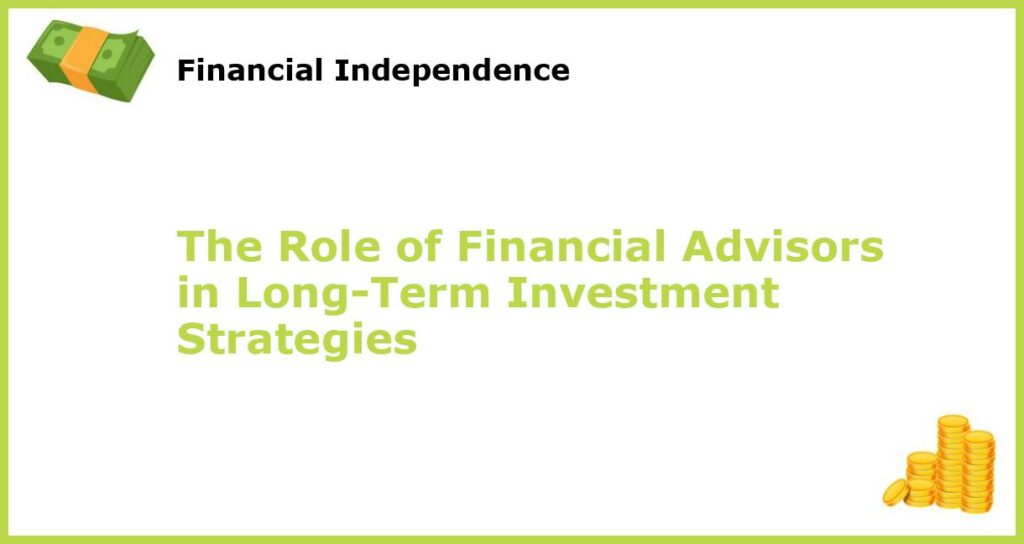Investment strategies can be complicated, and making sound investment decisions requires considerable knowledge, time, and effort. It’s common for people who are trying to invest in complex financial products to seek professional advice from financial advisors. A financial advisor can provide critical support and guidance to help create investment strategies that align with investment objectives and risk appetite. In this article, we’ll discuss the role of financial advisors in long-term investment strategies and the services they offer to their clients.
Diversification Strategies

Diversification is a cornerstone of long-term investment strategies. One of the primary roles of financial advisors is to help investors diversify their portfolios. A diversified portfolio allows investors to spread their capital across different assets such as bonds, stocks, and real estate, reducing the impact of underperformance of any single asset on their overall investment return. Asset allocation, which is the process of dividing investment capital into several asset classes, is a technique that financial advisors use to help investors diversify their investment portfolios. Based on their clients’ goals and risk appetite, advisors recommend asset allocation strategies that align with their investment objectives, which in turn help investors reduce their investment risk.
Risk Management

One of the critical functions of financial advisors is helping investors manage investment risk while balancing the potential for high returns. High-risk investment strategies offer potentially greater returns, but they also carry a higher likelihood of loss. An experienced financial advisor can help investors evaluate their risk tolerance, investment horizon, and objectives to provide investment guidance that will help mitigate risk without sacrificing returns. Financial advisors often employ several techniques to manage risk, such as educating investors on investment concepts, researching the best investment products, and monitoring client’s portfolios to ensure that they are consistent with their investment goals.
Asset Allocation

Asset allocation is a critical technique that financial advisors use to help investors achieve their financial goals while controlling risk. Advisors may help investors decide on an asset allocation strategy that allocates their investment funds across different asset classes, such as stocks, bonds, and real estate. The asset allocation strategy should match their investment goals and risk tolerance. A well-constructed asset allocation strategy can help investors reduce their risk, maximize returns, and assist with long-term wealth preservation. Advisors study their clients’ goals, risk appetite, and time horizon to provide customized asset allocation recommendations, a process that is continuously reviewed and updated to ensure that it remains aligned with the client’s investment goals.
Investment Monitoring

Financial advisors must monitor their client’s investments to ensure that they remain consistent with the investment goals they have set with their clients. An experienced financial advisor will keep track of the performance of their client’s investments, provide up-to-date analytics, and recommend adjustments when necessary. Close monitoring allows for timely adjustments to be made to keep the client on the path of their investment objectives. By regularly monitoring their client’s investments, financial advisors can help reduce the likelihood of investment risks significantly.
Retirement Planning
A financial advisor has the expertise to help investors create a solid retirement plan. Retirement planning is critical regardless of an investor’s age. An advisor will analyze their client’s current financial situation, estimate their future expenses, and determine the level of savings required to reach their retirement goals. Financial advisors employ various strategies, such as investing in tax-deferred retirement accounts or creating investment portfolios with specific retirement goals, such as income preservation or capital appreciation. With a well-designed retirement plan, investors can adjust their lifestyles during retirement and mitigate the risk of outliving their savings.
Estate Planning
Financial advisors play an essential role in estate planning, putting into consideration the tax implications and legal intricacies involved. When considering how wealth should be passed down, there are legal and tax implications that must be taken into account. Financial advisors identify tax-efficient strategies for the smooth transition of assets to beneficiaries. They can also structure financial instruments such as trusts and life insurance policies. Advisors use the available options to help ensure that beneficiaries receive their entitlement according to their wishes. This ensures that assets are preserved and distributed according to their clients’ needs and objectives.
Behavioral Coaching
Investors often have personal biases that can influence their investment decisions. Behavioral finance refers to human biases that can affect investment decisions. Sometimes investors can make irrational decisions caused by their emotions, often leading to poor investment choices. A Financial advisor can help prevent this by providing sound advice that balances the investor’s irrational emotional concerns and rational decision making. Behavioral coaching helps investors make informed investment choices, avoid emotionally charged financial decisions, and build long-term wealth.
Tax-Efficient Investing
A financial advisor can help investors minimize their tax liabilities while maximizing their returns by structuring investments in a tax-efficient manner. By minimizing the impact of taxes, a financial advisor can help investors optimize their investment returns. Tax-efficient investing strategies include investing in tax-advantaged accounts such as 401(k)s and Roth IRAs. Advisors study their client’s tax situation to provide advice on tax-saving opportunities that will save their clients money and optimize their investment returns.
Education and Guidance
Investing can be daunting, and investors require a great deal of insight to make sound investment plans. A financial advisor should educate and guide investors on investment strategies and how to build wealth in a way that aligns with their investment objectives and risk appetite. Advisors provide information about riskier investments while acquainting clients with foundational concepts in investing, allowing clients to make informed investment decisions.
Networking and Referrals
Financial advisors have networks of professionals and can facilitate referrals for their clients. Advisors understand that different clients have different needs, and facilitating referrals to qualified professionals, such as lawyers, accountants, or lenders, can help their clients find the professional expertise they need. Advisors can also facilitate investor networking and referrals to other clients who might benefit from opportunities such as real estate syndications or private investments.







